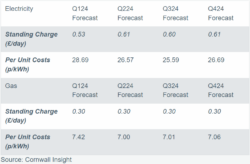From January 2024, average gas and electricity bills are forecast to stand at £1,931, according to energy analysts Cornwall Insight.
This is a 5% increase on the current energy price cap which is set at £1,834 a year. It is also up from the previous £1,923.33 predicted by Cornwall earlier this month.
However, it forecasts the energy price cap will decline from the end of March 2024 to £1,853.17 (Q2), then £1,824.98 (Q3) before rising to £1,863.02 in Q4.
These figures are down on predictions set just two weeks ago for dual fuel households:
- £1,929.09 in Q2 2024
- £1,879.66 in Q3 2024
- £1,916.81 in Q4 2024.
Cornwall Insight said its predictions “remain subject to ongoing volatility in the wholesale energy markets” but “will continue to remain well above historic levels”.

Why Life Insurance Still Matters – Even During a Cost-of-Living Crisis
Sponsored by Post Office
It cites the geopolitical concerns including the Israel-Hamas conflict, disruptions at the Finnish Balticconnector and industrial action at gas production facilities in Australia which all contribute to the higher energy unit prices.
However, it notes that the relatively mild weather has seen a slight dip in gas prices in recent weeks.
“If this trend persists, it might filter in to bills as we move through 2024. However, given the number variables which will weigh on the market over the next few months, sharp price falls are not expected,” Cornwall said.
Standing charges on the up?
Further, Cornwall also predicts a rise in electricity standing charges next year, with April seeing an 8p rise a day – from 53p to 61p. It said the high increase in electricity standing charges is primarily due to the ongoing reform of network charges, which has shifted more of the charges from per unit to per day, “meaning that customers will incur such costs regardless of their actual consumption”.
It’s important to note that the energy price cap sets a maximum price that energy suppliers can charge for each kilowatt hour (kWh) of energy and a daily limit on the standing charge applied which covers the cost of supplying energy to your home.
Energy companies aren’t obliged to have a standing charge and can charge less than what is set out in the price cap. Therefore, the energy price cap isn’t a cap on bills as how much you pay will depend on the amount of energy you use.
Today, the energy regulator Ofgem has opened a call for input on the standing charge – how it is applied to energy bills and what alternatives could be considered.
For now, the table below shows Cornwall Insight’s predictions on both the standing charge and unit rates for gas and electricity in the year ahead:
Ofgem sets the energy price cap quarterly, with the next announcement for January to March 2024 due on Thursday 23 November.
Dr Craig Lowrey, principal consultant at Cornwall Insight, said: “An unstable wholesale energy market, coupled with the UK’s reliance on energy imports, makes it inevitable that energy bills will rise from current levels. This leaves households facing yet another winter with bills hundreds of pounds higher than pre-pandemic levels, and affordable fixed deals few and far between.
“The King’s Speech acknowledged that it is our exposure to volatile international energy markets that has led to higher and less predictable bills. While we continue to advocate for immediate targeted support for vulnerable consumers, it is evident that the only enduring solution lies in transitioning the UK away from the influence of global energy prices towards sustainable, domestically sourced energy.”
‘Price cap is no longer fit for purpose’
Richard Neudegg, director of regulation at Uswitch.com, said: “A week ahead of the price cap announcement, this is a firm prediction that energy costs will rise by 5% for households on standard variable tariffs in January.
“This price rise will come at the worst time of year for households, who will be using more energy at home during one of the coldest points of the winter.
“This quarterly price change is piling extra financial uncertainty on consumers, as it’s challenging to budget for a bill when rates can change so frequently.
“Fixed rate deals remain the only way that consumers can secure any certainty about what they will pay for energy for a year. Yet more still needs to be done by Ofgem to encourage suppliers to offer fixed deals more widely and at more competitive prices.
“The price cap is no longer fit for purpose, and the system needs reforming to create a more competitive market, which also protects households.”

